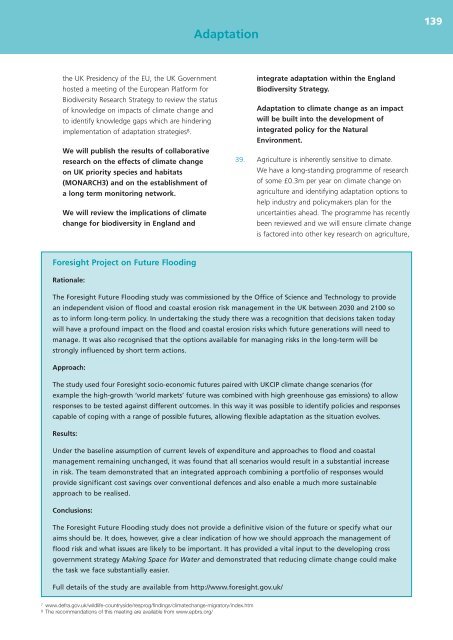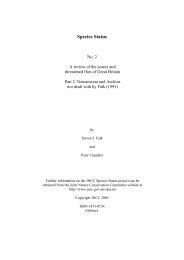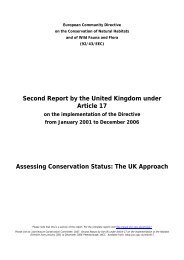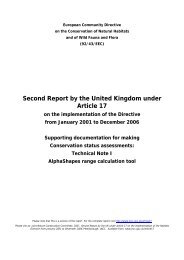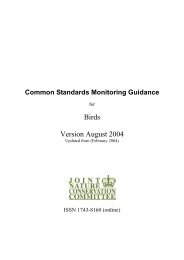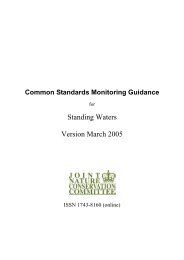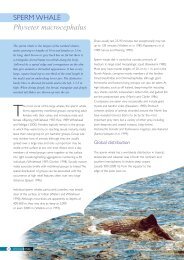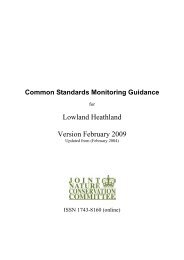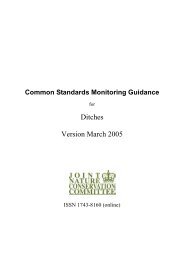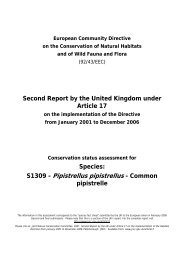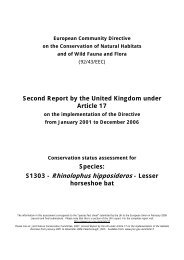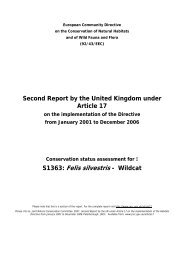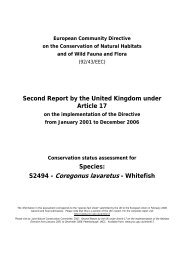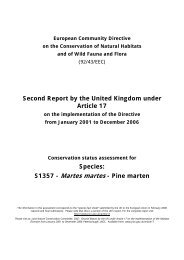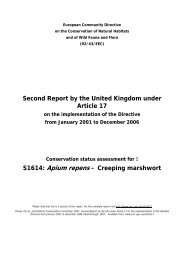UK Climate Change Programme 2006 - JNCC - Defra
UK Climate Change Programme 2006 - JNCC - Defra
UK Climate Change Programme 2006 - JNCC - Defra
You also want an ePaper? Increase the reach of your titles
YUMPU automatically turns print PDFs into web optimized ePapers that Google loves.
Adaptation<br />
139<br />
the <strong>UK</strong> Presidency of the EU, the <strong>UK</strong> Government<br />
hosted a meeting of the European Platform for<br />
Biodiversity Research Strategy to review the status<br />
of knowledge on impacts of climate change and<br />
to identify knowledge gaps which are hindering<br />
implementation of adaptation strategies 8 .<br />
We will publish the results of collaborative<br />
research on the effects of climate change<br />
on <strong>UK</strong> priority species and habitats<br />
(MONARCH3) and on the establishment of<br />
a long term monitoring network.<br />
We will review the implications of climate<br />
change for biodiversity in England and<br />
integrate adaptation within the England<br />
Biodiversity Strategy.<br />
Adaptation to climate change as an impact<br />
will be built into the development of<br />
integrated policy for the Natural<br />
Environment.<br />
39. Agriculture is inherently sensitive to climate.<br />
We have a long-standing programme of research<br />
of some £0.3m per year on climate change on<br />
agriculture and identifying adaptation options to<br />
help industry and policymakers plan for the<br />
uncertainties ahead. The programme has recently<br />
been reviewed and we will ensure climate change<br />
is factored into other key research on agriculture,<br />
Foresight Project on Future Flooding<br />
Rationale:<br />
The Foresight Future Flooding study was commissioned by the Office of Science and Technology to provide<br />
an independent vision of flood and coastal erosion risk management in the <strong>UK</strong> between 2030 and 2100 so<br />
as to inform long-term policy. In undertaking the study there was a recognition that decisions taken today<br />
will have a profound impact on the flood and coastal erosion risks which future generations will need to<br />
manage. It was also recognised that the options available for managing risks in the long-term will be<br />
strongly influenced by short term actions.<br />
Approach:<br />
The study used four Foresight socio-economic futures paired with <strong>UK</strong>CIP climate change scenarios (for<br />
example the high-growth ‘world markets’ future was combined with high greenhouse gas emissions) to allow<br />
responses to be tested against different outcomes. In this way it was possible to identify policies and responses<br />
capable of coping with a range of possible futures, allowing flexible adaptation as the situation evolves.<br />
Results:<br />
Under the baseline assumption of current levels of expenditure and approaches to flood and coastal<br />
management remaining unchanged, it was found that all scenarios would result in a substantial increase<br />
in risk. The team demonstrated that an integrated approach combining a portfolio of responses would<br />
provide significant cost savings over conventional defences and also enable a much more sustainable<br />
approach to be realised.<br />
Conclusions:<br />
The Foresight Future Flooding study does not provide a definitive vision of the future or specify what our<br />
aims should be. It does, however, give a clear indication of how we should approach the management of<br />
flood risk and what issues are likely to be important. It has provided a vital input to the developing cross<br />
government strategy Making Space for Water and demonstrated that reducing climate change could make<br />
the task we face substantially easier.<br />
Full details of the study are available from http://www.foresight.gov.uk/<br />
7 www.defra.gov.uk/wildlife-countryside/resprog/findings/climatechange-migratory/index.htm<br />
8 The recommendations of this meeting are available from www.epbrs.org/


